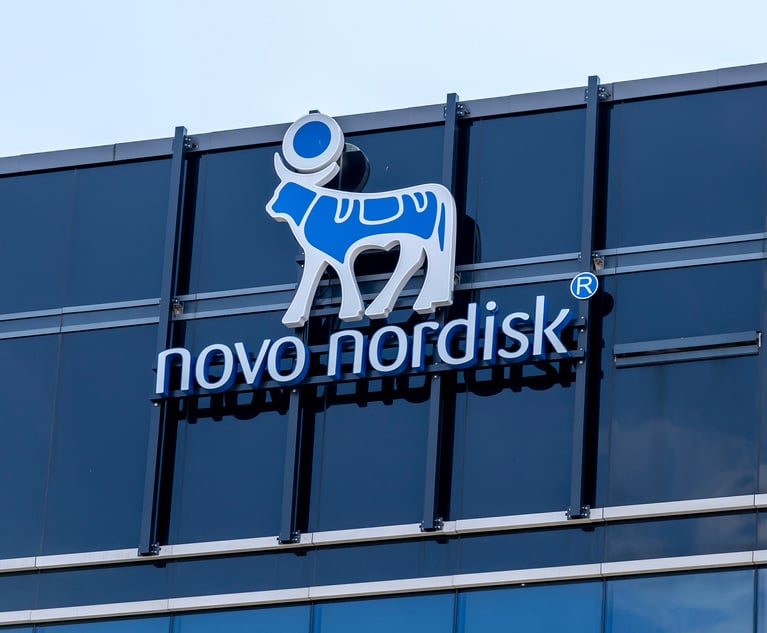Texas AG Teams With Baron & Budd to Recover $123M in Medicaid Fraud Settlements
“The politics really didn't matter,” Baron & Budd partner Scott Simmer added. “This was about protecting the Texas Medicaid program.”
August 09, 2018 at 04:02 PM
4 minute read
 Baron & Budd partner Scott Simmer/Courtesy photo
Baron & Budd partner Scott Simmer/Courtesy photo
Over the past two weeks, Texas and its conservative Republican attorney general, Ken Paxton, settled three separate Medicaid fraud suits with pharmaceutical companies totaling over $123 million.
And proving that politics and law often make for some strange bedfellows, none of those settlements would have been possible without the help of lawyers from Baron & Budd, a Dallas-based plaintiffs firm founded by the late Fred Baron and Russell Budd, two well-known fundraisers for the Democratic Party. The law firm represents the whistleblowers who originally filed all three fraud cases.
The cases were all filed under the Texas Medicaid Fraud Prevention Act, a 1995 qui tam statute that allows whistleblowers to pursue private causes of action for fraud along with the state government.
On Aug. 7, AstraZeneca agreed to a $110 million settlement to resolve two whistleblower suits brought by the state and private plaintiffs under the TMFPA. The first settlement is worth $90 million and resolves allegations that the company fraudulently marketed a powerful antipsychotic drug, Seroquel. A second settlement worth $20 million resolves allegations that the company misrepresented and concealed information about the appropriate use of Crestor, a drug used to treat high cholesterol.
“Texas leads the country in protecting its Medicaid system from pharmaceutical fraud,” Paxton said in a statement. “The allegations that led to this settlement are especially disturbing because the well-being of children and the integrity of the state hospital system were jeopardized. The cooperation and support of the Texas Health and Human Services Commission was essential in achieving this outstanding outcome for Texans.”
And on Aug. 1, Endo Pharmaceuticals Inc. agreed to pay a $13.25 million settlement in a whistleblower suit brought by the state that alleged that Endo misrepresented and concealed information about the nerve pain drug Lidoderm.
Baron & Budd represented whistleblowers in all three cases who'd originally filed federal False Claims Act cases in federal courts outside of Texas. In each of those cases, lawyers from the Texas Attorney General's Office convinced the whistleblowers to refile their cases in Travis County state district court under the TMFP, said Scott Simmer, a Baron & Budd partner who represents whistleblowers.
The Texas Attorney General's Office later intervened in all of the state court cases, Simmer said.
“They have a long history of significant recovery for Medicaid cases. We first started working with the AG's office on these three cases over four years ago. And we litigated right along with the AG's office,” Simmer said.
Simmer's former Washington, D.C., law firm, the Simmer Law Group, specialized in qui tam litigation and merged with Baron & Budd in March, a move that helped expand the Dallas firm's practice, which has traditionally focused on asbestos and mass tort litigation.
And the combined effort between plaintiff firms and the Texas Attorney General's Office that resulted in the huge back-to-back settlements—of which the whistleblowers will receive a 15 percent to 20 percent share—is exactly what qui tam laws are supposed to do, Simmer said.
“It was the best example of a public-private partnership and how these statutes are supposed to work,” Simmer said. “I'm tremendously proud of what we accomplished but also proud of having worked with tremendous people.''
Simmer praised Assistant Texas Attorneys General Ray Winter, Cynthia O'Keeffe, Eugenia Krieg, and Kris Kennedy for their efforts in pursuing the qui tam claims on behalf of the state.
“The Texas Attorney General's Office has been very conscientious in investigating and prosecuting Medicaid fraud allegations brought by our whistleblowers, who uncovered this fraud,” Simmer said.
“The politics really didn't matter,” Simmer added. “This was about protecting the Texas Medicaid program.”
John C. Dodds, a Philadelphia attorney who represents AstraZeneca, and Jon Stern, a Washington, D.C., attorney who represents Endo, did not return calls for comment.
This content has been archived. It is available through our partners, LexisNexis® and Bloomberg Law.
To view this content, please continue to their sites.
Not a Lexis Subscriber?
Subscribe Now
Not a Bloomberg Law Subscriber?
Subscribe Now
NOT FOR REPRINT
© 2025 ALM Global, LLC, All Rights Reserved. Request academic re-use from www.copyright.com. All other uses, submit a request to [email protected]. For more information visit Asset & Logo Licensing.
You Might Like
View All

43 States Reach $700 Million Settlement With J&J in Talc Product Lawsuits

Novo Nordisk Files Multiple Complaints Alleging Trademark Infringement, False Advertising Across U.S.
4 minute read
'How Can It Be Enough?': Thousands Have Agreed to the Risperdal Settlement. A Few Holdouts Remain
Trending Stories
- 1'It's Not Going to Be Pretty': PayPal, Capital One Face Novel Class Actions Over 'Poaching' Commissions Owed Influencers
- 211th Circuit Rejects Trump's Emergency Request as DOJ Prepares to Release Special Counsel's Final Report
- 3Supreme Court Takes Up Challenge to ACA Task Force
- 4'Tragedy of Unspeakable Proportions:' Could Edison, DWP, Face Lawsuits Over LA Wildfires?
- 5Meta Pulls Plug on DEI Programs
Who Got The Work
Michael G. Bongiorno, Andrew Scott Dulberg and Elizabeth E. Driscoll from Wilmer Cutler Pickering Hale and Dorr have stepped in to represent Symbotic Inc., an A.I.-enabled technology platform that focuses on increasing supply chain efficiency, and other defendants in a pending shareholder derivative lawsuit. The case, filed Oct. 2 in Massachusetts District Court by the Brown Law Firm on behalf of Stephen Austen, accuses certain officers and directors of misleading investors in regard to Symbotic's potential for margin growth by failing to disclose that the company was not equipped to timely deploy its systems or manage expenses through project delays. The case, assigned to U.S. District Judge Nathaniel M. Gorton, is 1:24-cv-12522, Austen v. Cohen et al.
Who Got The Work
Edmund Polubinski and Marie Killmond of Davis Polk & Wardwell have entered appearances for data platform software development company MongoDB and other defendants in a pending shareholder derivative lawsuit. The action, filed Oct. 7 in New York Southern District Court by the Brown Law Firm, accuses the company's directors and/or officers of falsely expressing confidence in the company’s restructuring of its sales incentive plan and downplaying the severity of decreases in its upfront commitments. The case is 1:24-cv-07594, Roy v. Ittycheria et al.
Who Got The Work
Amy O. Bruchs and Kurt F. Ellison of Michael Best & Friedrich have entered appearances for Epic Systems Corp. in a pending employment discrimination lawsuit. The suit was filed Sept. 7 in Wisconsin Western District Court by Levine Eisberner LLC and Siri & Glimstad on behalf of a project manager who claims that he was wrongfully terminated after applying for a religious exemption to the defendant's COVID-19 vaccine mandate. The case, assigned to U.S. Magistrate Judge Anita Marie Boor, is 3:24-cv-00630, Secker, Nathan v. Epic Systems Corporation.
Who Got The Work
David X. Sullivan, Thomas J. Finn and Gregory A. Hall from McCarter & English have entered appearances for Sunrun Installation Services in a pending civil rights lawsuit. The complaint was filed Sept. 4 in Connecticut District Court by attorney Robert M. Berke on behalf of former employee George Edward Steins, who was arrested and charged with employing an unregistered home improvement salesperson. The complaint alleges that had Sunrun informed the Connecticut Department of Consumer Protection that the plaintiff's employment had ended in 2017 and that he no longer held Sunrun's home improvement contractor license, he would not have been hit with charges, which were dismissed in May 2024. The case, assigned to U.S. District Judge Jeffrey A. Meyer, is 3:24-cv-01423, Steins v. Sunrun, Inc. et al.
Who Got The Work
Greenberg Traurig shareholder Joshua L. Raskin has entered an appearance for boohoo.com UK Ltd. in a pending patent infringement lawsuit. The suit, filed Sept. 3 in Texas Eastern District Court by Rozier Hardt McDonough on behalf of Alto Dynamics, asserts five patents related to an online shopping platform. The case, assigned to U.S. District Judge Rodney Gilstrap, is 2:24-cv-00719, Alto Dynamics, LLC v. boohoo.com UK Limited.
Featured Firms
Law Offices of Gary Martin Hays & Associates, P.C.
(470) 294-1674
Law Offices of Mark E. Salomone
(857) 444-6468
Smith & Hassler
(713) 739-1250






